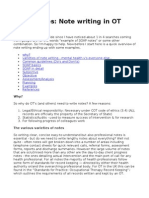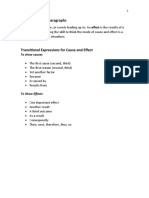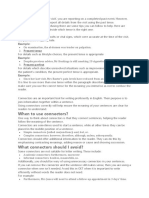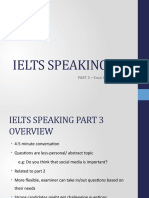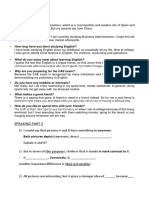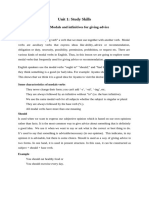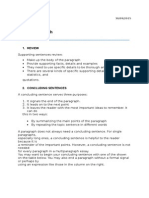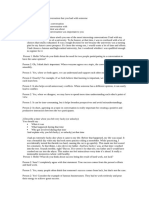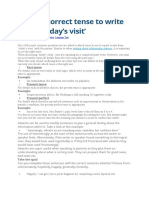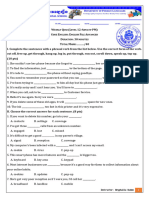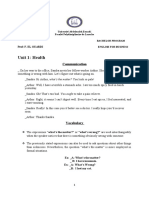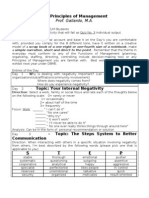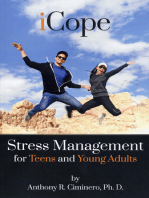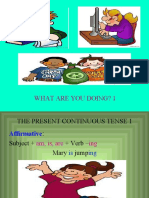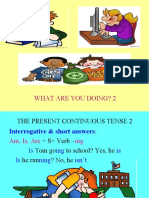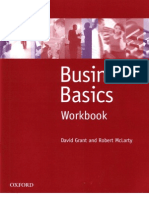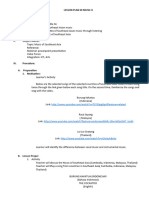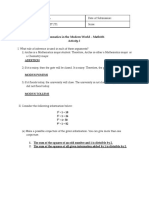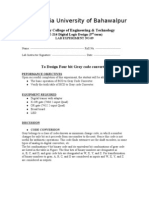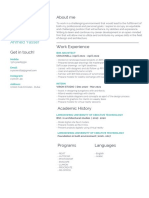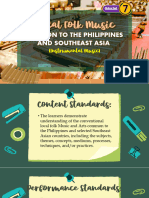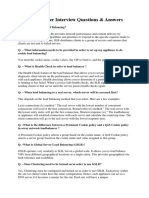0 ratings0% found this document useful (0 votes)
524 viewsUnit 4 - Dealing With Stress
Unit 4 - Dealing With Stress
Uploaded by
Mirko Alexandro Hernández SantanaThis document contains a unit on dealing with stress. It includes exercises ranking common stressful situations, listening to an interview with the director of a stress management consultancy, reading an article about stress levels in Chile, and a discussion of stressful jobs. It also reviews grammar concepts like past simple vs present perfect tense, adjective degrees of comparison, and modal verbs. The document provides material for students to learn about and discuss different sources and types of stress.
Copyright:
© All Rights Reserved
Available Formats
Download as PDF, TXT or read online from Scribd
Unit 4 - Dealing With Stress
Unit 4 - Dealing With Stress
Uploaded by
Mirko Alexandro Hernández Santana0 ratings0% found this document useful (0 votes)
524 views8 pagesThis document contains a unit on dealing with stress. It includes exercises ranking common stressful situations, listening to an interview with the director of a stress management consultancy, reading an article about stress levels in Chile, and a discussion of stressful jobs. It also reviews grammar concepts like past simple vs present perfect tense, adjective degrees of comparison, and modal verbs. The document provides material for students to learn about and discuss different sources and types of stress.
Copyright
© © All Rights Reserved
Available Formats
PDF, TXT or read online from Scribd
Share this document
Did you find this document useful?
Is this content inappropriate?
This document contains a unit on dealing with stress. It includes exercises ranking common stressful situations, listening to an interview with the director of a stress management consultancy, reading an article about stress levels in Chile, and a discussion of stressful jobs. It also reviews grammar concepts like past simple vs present perfect tense, adjective degrees of comparison, and modal verbs. The document provides material for students to learn about and discuss different sources and types of stress.
Copyright:
© All Rights Reserved
Available Formats
Download as PDF, TXT or read online from Scribd
Download as pdf or txt
0 ratings0% found this document useful (0 votes)
524 views8 pagesUnit 4 - Dealing With Stress
Unit 4 - Dealing With Stress
Uploaded by
Mirko Alexandro Hernández SantanaThis document contains a unit on dealing with stress. It includes exercises ranking common stressful situations, listening to an interview with the director of a stress management consultancy, reading an article about stress levels in Chile, and a discussion of stressful jobs. It also reviews grammar concepts like past simple vs present perfect tense, adjective degrees of comparison, and modal verbs. The document provides material for students to learn about and discuss different sources and types of stress.
Copyright:
© All Rights Reserved
Available Formats
Download as PDF, TXT or read online from Scribd
Download as pdf or txt
You are on page 1of 8
1
Unit IV: Dealing with stress
1. Rank these situations from 1 (most stressful) to 7 (least stressful). Then discuss
your choices.
failing a subject
showing up in classes without the material
writing a report/doing a homework with someone you don't get along with
breaking up with your boyfriend/girlfriend
giving your opinion in the English class
asking your teacher to move a deadline or test.
making a presentation for your IO class
! Now think about your future: What do you think are the main causes of stress at
work?
2. Listening
1. Alan Bradshaw is a director of "In Equilibrium", a stress management consultancy. Listen
to the first part of the interview and complete these notes.
2. Listen to the 2nd part of the interview and answer this question.
What are the two main ways in which In Equilibrium helps companies to deal with
stress?
Useful Vocabulary for this Unit: Healthy environment, Medical check-up, counseling service, stress
management, pressure, workaholic, deadline, workload. CAN YOU THINK IN ANY OTHER?
Alan Bradshaw
2
c. Which do you think apply more to men or women?
have more pressure outside work
worry more about making mistakes
pay more attention to details
are less worried about deadlines
are more likely to become angry and stressed
are better at doing many things at the same time.
3. Read and Discuss
Santiago Leads Chile In Reports Of Chronic Stress
By Editor
Published On : Wed, Jan 26th, 2011
The Ministry of Health has released a new survey revealing that 1.5 million Chileans suffer from
stress. The inhabitants of the Metropolitan Region and the extreme zones in the country are the
most affected.
Santiaguinos have the highest levels of chronic stress with 11.2 percent, followed by the residents
of the Arica and Parinacota and Magallanes.
These facts imply that almost 1.5 million people reported feeling constantly stressed in the past
two months.
When split between genders, women demonstrated feeling twice as stressed as men. In terms of
age, Chileans between 24 and 44 lead with the highest reports of chronic stress.
Higher stress is a known contributor to heart disease. Last week the Ministry of Health released
data demonstrating that Chileans eat, drink and smoke in excess, all of which contributes to the
high rates of stress among the population.
In relation to financial stress the numbers increased almost twofold. An average of 18 percent of
the population reported suffering from constant financial stress.
The study also revealed that 12.1 percent of Chileans reported feeling helpless as if they have no
control over their own lives.
3
4. Discussion: Stressful jobs
Look at the words in the box. Discuss where to put the jobs in the stress chart below.
As engineers are not included, where do you think it should go in the list?
Do you like working under pressure? Why? Why not?
What deadline do you have to meet in your daily life? Which is it most
difficult to meet?
Why do you think people become workaholic?
4
5. Language Review
A. Past Simple VS Present Perfect
We use the PAST SIMPLE to talk about FINISHED ACTIONS.
e.g. I had a very tense meeting with my boss this morning.
I didn't go to the cinema, I went to the gym.
Did you finish the budget report last night?
We use the PRESENT PERFECT to talk about:
An action that started in the past and continues in the present (and might
continue in the future):
e.g. I have worked in this bank for ten years. ( I still work in the bank)
An action that recently finished
e.g. I have just had lunch.
An action that started in the past and has an effect in the present (and in the
future):
e.g. My brother has broken his glasses. (He broke his glasses, and they
are still broken now)
5
B. Adjective
In English we can find adjectives in different degrees.
Equality Comparative Superlative
John is as tall as his
classmate.
The red car is as
expensive as the black
car.
John is taller than is
classmate.
The red car is more
expensive than the
black car.
John is the tallest in the
class.
The red car is the most
expensive car.
1. Write these sentences using equality adjectives
1.My bedroom is / big / yours.
____________________________________________________
2. I have / brothers / Mary.
____________________________________________________
3. He doesn't listen / music / I do.
____________________________________________________
4. Are you / young / me?
____________________________________________________
5. This restaurant is / good / any in the world.
____________________________________________________
6. He isn't / smart / people think.
____________________________________________________
7. I found / information / I needed in this book.
____________________________________________________
6
2. Write sentences with comparative and superlatives
7
C. Modal Verbs
We use modal verbs to show if we believe something is certain or possible. We also use
modal verbs to talk about permission, ability, obligation, advice, offers and so on.
Some modal verbs are:
can, could, will, would, might, may, must, should
1. Choose the best modal verb for the sentences.
Q1 - They ____ be on holiday, but I'm not sure.
___ can
___ might
Q2 - You ____ be right, but I'd still like to check.
can
could
8
Q3 - ____ you turn it down a bit please?
Can
May
Q4 - It's OK- you ____ go when you've finished.
may
might
Q5 - Ask any questions now as you ____ not talk during the test.
may
could
Q6 - You ____ smoke in the cinema.
can't
might not
2. Complete the sentences with a suitable modal verb.
1-I have no time. I _____________ leave now or I miss the bus.
2-I wish ___________I buy a new mobile phone but I don't have
enough money.
3-She looks tired; she ____________ take some days off.
4-Tom____________ play tennis quite well. I usually play with him
every weekend.
5-If it rains on Saturday, we __________go to the beach.
6-____________you speak German? No, I __________.
7-I haven't decided yet where ____________I go in my next holidays. I think
I_____________ go to Paris.
8-You ____________not be so nervous. I think it ____________be very
easy.
You might also like
- Quick Notes OT's SOAPDocument5 pagesQuick Notes OT's SOAPAriya Au100% (5)
- Cause and Effect PamDocument10 pagesCause and Effect PamGMLV GMMNo ratings yet
- When DiscussingDocument46 pagesWhen DiscussingOana Maria Grigore100% (1)
- Teaching Noun ClausesDocument9 pagesTeaching Noun Clausesarifty100% (1)
- Ielts Speaking Part 3-1Document12 pagesIelts Speaking Part 3-1Shintya DewiNo ratings yet
- Speaking Part 1: Both Pictures Depict (Represent, Show)Document6 pagesSpeaking Part 1: Both Pictures Depict (Represent, Show)Jing Luis CaoNo ratings yet
- Psychosocial Health QuestionnairesDocument5 pagesPsychosocial Health QuestionnairesJADE LYKAROSE GALENDONo ratings yet
- Speaking Topics For RevisionDocument3 pagesSpeaking Topics For RevisionHồng KimNo ratings yet
- Tarea 6 UNITS 9, 10 & 11 Bank and Money/Medical Problems/ Rooms in A House Task 1-Bank and Money: Bills and CoinsDocument5 pagesTarea 6 UNITS 9, 10 & 11 Bank and Money/Medical Problems/ Rooms in A House Task 1-Bank and Money: Bills and CoinsDavid PerezNo ratings yet
- Unit 1 B1Document4 pagesUnit 1 B1hajjimalak.05No ratings yet
- Talking With Children Unit - Elementary-2Document8 pagesTalking With Children Unit - Elementary-2Marah ANo ratings yet
- Cause and Effect Activity - 1Document4 pagesCause and Effect Activity - 1Lourdes ParedesNo ratings yet
- Part 1. Pre-Listening Exercise: 1. What Are The Causes of Stress in High School Students?Document5 pagesPart 1. Pre-Listening Exercise: 1. What Are The Causes of Stress in High School Students?Mary de los AngelesNo ratings yet
- About My 3 Oral PresentationDocument4 pagesAbout My 3 Oral Presentationapi-38262180% (1)
- Using Interactions in Real LifeDocument2 pagesUsing Interactions in Real Lifeealzueta4712No ratings yet
- Personality Development: Quarter 1 - Module 4-5: Aspects of Personal DevelopmentDocument13 pagesPersonality Development: Quarter 1 - Module 4-5: Aspects of Personal DevelopmentSansay SaylonNo ratings yet
- Communicative English I Grammar LessonsDocument49 pagesCommunicative English I Grammar LessonsdidagermewNo ratings yet
- Assignment For Summer Students 2023 EdsDocument6 pagesAssignment For Summer Students 2023 Edsnafnat abdela100% (1)
- essential grammarDocument10 pagesessential grammarvylam nguyenNo ratings yet
- FORUM SECTION and SELF EVALUATION-1Document7 pagesFORUM SECTION and SELF EVALUATION-1Veronica Parras MuñozNo ratings yet
- SPEAKING TOPICS FOR REVISIONDocument5 pagesSPEAKING TOPICS FOR REVISIONzoiubh123No ratings yet
- Homeroom Guidance.Q2.Module 6Document3 pagesHomeroom Guidance.Q2.Module 6Marjorie Tigoy100% (1)
- Alex Class 4Document8 pagesAlex Class 4Gustavo IannaconeNo ratings yet
- 1010 Interview 03 Student Example-Part 1Document4 pages1010 Interview 03 Student Example-Part 1api-265617696No ratings yet
- Assessment in English 9 Fourth QuarterDocument5 pagesAssessment in English 9 Fourth QuarterJoan BedioresNo ratings yet
- Per Dev Q1 Module 8 FinalDocument19 pagesPer Dev Q1 Module 8 FinalElvira Dagalangit100% (1)
- PrepareDocument3 pagesPreparekrajasekarantutiNo ratings yet
- e subDocument6 pagese subthodna22No ratings yet
- Detailed Lesson Plan in Grade 8 - EnglishDocument13 pagesDetailed Lesson Plan in Grade 8 - EnglishSinz LumbresDayandayan Revellame100% (1)
- LAS 1 HOPE 4 Recreation WEEK 1 and 20Document5 pagesLAS 1 HOPE 4 Recreation WEEK 1 and 20Marcjay BubanNo ratings yet
- Essential StandardsDocument46 pagesEssential Standardsapi-340096861No ratings yet
- Sample Structured Interview Questions: From HSRIDocument7 pagesSample Structured Interview Questions: From HSRIMubashir ZiaNo ratings yet
- OET Official Blog Notes - 3Document29 pagesOET Official Blog Notes - 3Mehmet Şevki Uyanık100% (1)
- Final Exam J4Document8 pagesFinal Exam J4institutoaccentNo ratings yet
- Speaking Part 4Document2 pagesSpeaking Part 4EwaNo ratings yet
- Weekly Quiz-Lv12-Unit-6B-VocabDocument4 pagesWeekly Quiz-Lv12-Unit-6B-VocabPhalla OudomNo ratings yet
- Notes of LessonDocument11 pagesNotes of LessonYnah MutiaNo ratings yet
- Unit 1 Bachelor 2 SEMDocument4 pagesUnit 1 Bachelor 2 SEMAchraf El khatibNo ratings yet
- Oral Com - LAS M8Document22 pagesOral Com - LAS M8Edina YuzonNo ratings yet
- MUET SpeakingDocument6 pagesMUET SpeakingAisya Jamal100% (1)
- FFFFFFDocument3 pagesFFFFFFDaniel Kevin100% (1)
- Unit 4 - SpeakingDocument9 pagesUnit 4 - Speakingtoannv8187No ratings yet
- QTR 1 Module 1 - Lesson 4Document23 pagesQTR 1 Module 1 - Lesson 4Gissele AbolucionNo ratings yet
- HRG Module 2Document3 pagesHRG Module 2Mari PagxNo ratings yet
- IMGLESDocument5 pagesIMGLESmilenaandagoya31No ratings yet
- English9 Q4 W4 Mod4Document16 pagesEnglish9 Q4 W4 Mod4Mia Dela Cuest0% (1)
- English9 Q4 W4 Mod4Document16 pagesEnglish9 Q4 W4 Mod4alfredoatis794No ratings yet
- Lesson Plan in Health 7 CSEDocument5 pagesLesson Plan in Health 7 CSEMiriam Ebora GatdulaNo ratings yet
- HGPQ2L2 - My Journey To A Stronger MeDocument9 pagesHGPQ2L2 - My Journey To A Stronger MeRico PalmaNo ratings yet
- Home Room Guidance Act.Document17 pagesHome Room Guidance Act.janellabautista48No ratings yet
- Hieu - 01Document6 pagesHieu - 01uocmo2021No ratings yet
- PTE - Links N TipsDocument48 pagesPTE - Links N TipsSupriya Ghanta100% (2)
- Grammar: Units 1-12Document3 pagesGrammar: Units 1-12Keyra Aguilar CondeNo ratings yet
- WEEK 4 Lesson 7 8 Patterns of Development in WritingDocument11 pagesWEEK 4 Lesson 7 8 Patterns of Development in Writingokinawa familyNo ratings yet
- IBE Principles of ManagementDocument5 pagesIBE Principles of ManagementRitzelle CabangbangNo ratings yet
- B1 ALCPT Grammar and Reading ComprehensionDocument7 pagesB1 ALCPT Grammar and Reading Comprehensionjorge.roaNo ratings yet
- iCope: Stress Management for Teens and Young AdultsFrom EverandiCope: Stress Management for Teens and Young AdultsNo ratings yet
- Great Debates for ESL/EFL: 39 Important Debating Topics for English LearnersFrom EverandGreat Debates for ESL/EFL: 39 Important Debating Topics for English LearnersNo ratings yet
- What Are They Doing 1Document21 pagesWhat Are They Doing 1Mirko Alexandro Hernández SantanaNo ratings yet
- What Are They Doing 2Document21 pagesWhat Are They Doing 2Mirko Alexandro Hernández SantanaNo ratings yet
- Business Basics WBDocument90 pagesBusiness Basics WBMia Asmiati100% (9)
- Unit 2 - World of CompaniesDocument7 pagesUnit 2 - World of CompaniesMirko Alexandro Hernández SantanaNo ratings yet
- Lab Activity - Unit 4Document1 pageLab Activity - Unit 4Mirko Alexandro Hernández SantanaNo ratings yet
- Syed-Qamar-Abbas-CVDocument1 pageSyed-Qamar-Abbas-CVsyedqamarabbas2000No ratings yet
- Meaning and Relevance of HistoryDocument19 pagesMeaning and Relevance of HistoryJohn Michael TalaNo ratings yet
- 40 Free Fonts PreviewDocument41 pages40 Free Fonts PreviewLuis RetaNo ratings yet
- Journal of Mathematics Education and Science: p-ISSN: 2621-1203 VOL. 5 NO. 1 (2022) : 63-72 e-ISSN: 2621-1211Document10 pagesJournal of Mathematics Education and Science: p-ISSN: 2621-1203 VOL. 5 NO. 1 (2022) : 63-72 e-ISSN: 2621-1211Nadia OctaviaNo ratings yet
- Samples of Compare and Contrast Essays ThesisDocument5 pagesSamples of Compare and Contrast Essays Thesisgingermartinerie100% (2)
- SDC PDFDocument2 pagesSDC PDFCharan UkkuNo ratings yet
- Lesson Plan in Music 8Document3 pagesLesson Plan in Music 8Jahazelle PoloNo ratings yet
- Module 2Document6 pagesModule 2kasugabarangay700No ratings yet
- Books: The Ultimate Medium of Universal KnowledgeDocument2 pagesBooks: The Ultimate Medium of Universal KnowledgeShishir JessuNo ratings yet
- Unit 4 - English in South AfricaDocument38 pagesUnit 4 - English in South AfricaXuan Mai ĐàmNo ratings yet
- MMW Activity 3Document3 pagesMMW Activity 3Melanie MacasaNo ratings yet
- WebSphere Lombardi Edition-7.1.0-Authoring Environment User GuideDocument370 pagesWebSphere Lombardi Edition-7.1.0-Authoring Environment User GuideMukesh SharmaNo ratings yet
- Practical 9DLDDocument3 pagesPractical 9DLDAbbas AbbasiNo ratings yet
- Mais Salsabila - UTS MorphologyDocument14 pagesMais Salsabila - UTS Morphology9jvvq2bpzgNo ratings yet
- CSS 2015 English Solved PaperDocument9 pagesCSS 2015 English Solved PaperMagsi Abdul Aziz71% (17)
- 5 Positive and Negative MessagesDocument21 pages5 Positive and Negative MessagesSharmaine LontocNo ratings yet
- Essay Meet The Short StoryDocument3 pagesEssay Meet The Short StoryPedro J NegronNo ratings yet
- 3421 9693 1 PBDocument12 pages3421 9693 1 PBAmanda AlazzamNo ratings yet
- Ahmed Yasser: About MeDocument1 pageAhmed Yasser: About Meahmed yasserNo ratings yet
- MAD (22617) AssignmentQuestionsDocument3 pagesMAD (22617) AssignmentQuestionsharshdpatil445No ratings yet
- 10 Gki2023 103Document4 pages10 Gki2023 103Ngân Trần ThịNo ratings yet
- H. Psalm 119.57-64 PDFDocument10 pagesH. Psalm 119.57-64 PDFpacurarNo ratings yet
- Ramadan Amaal Laylatul Qadr 19th 21st Night Ara Eng Transliteration PDFDocument564 pagesRamadan Amaal Laylatul Qadr 19th 21st Night Ara Eng Transliteration PDFjohn davidNo ratings yet
- Salesrep ValidationDocument3 pagesSalesrep ValidationindusbreedNo ratings yet
- LOCAL FOLK MUSIC - Instrumental MusicDocument34 pagesLOCAL FOLK MUSIC - Instrumental Musickristel guanzonNo ratings yet
- Guide To French For Movies and TV SeriesDocument9 pagesGuide To French For Movies and TV SeriesEmilia WidyatnaNo ratings yet
- Visual Literacy Lesson Plan Assignment 2023 2 2Document4 pagesVisual Literacy Lesson Plan Assignment 2023 2 2api-705311561No ratings yet
- Load Balancer Interview Questions & AnswersDocument15 pagesLoad Balancer Interview Questions & Answersajay kumarNo ratings yet
- Unit 3 WBDocument6 pagesUnit 3 WBClaudia SilvaNo ratings yet
- Vxworks Cli Tools Users Guide 6.2Document100 pagesVxworks Cli Tools Users Guide 6.2Jakki ReddyNo ratings yet
